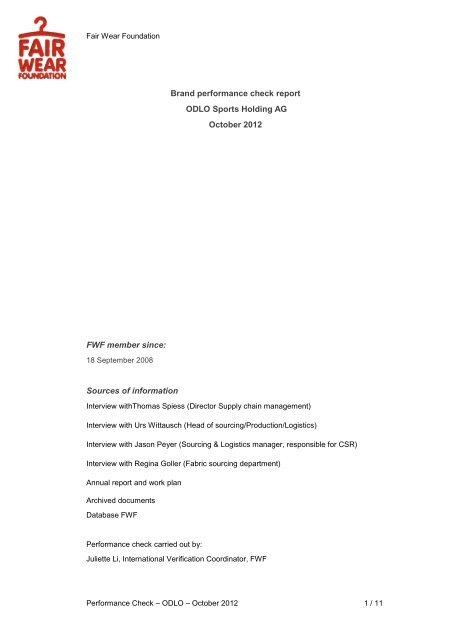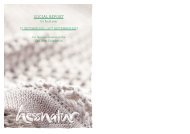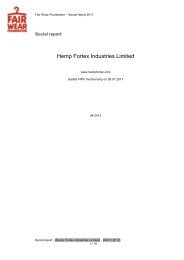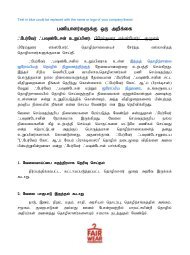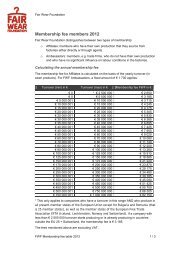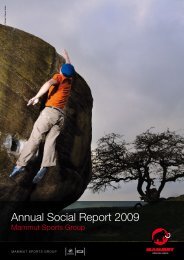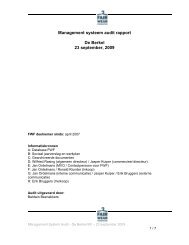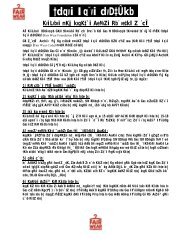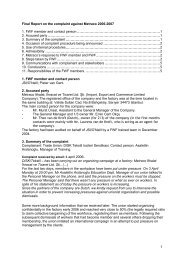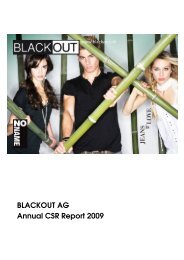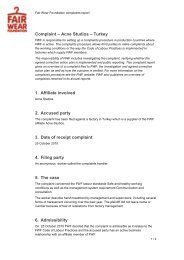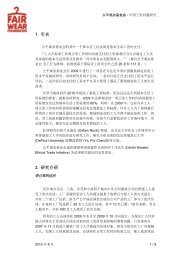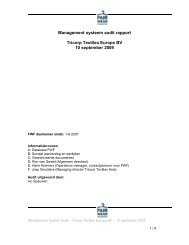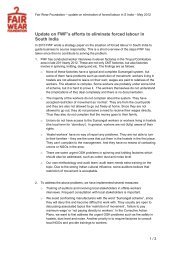October 2012 - Fair Wear Foundation
October 2012 - Fair Wear Foundation
October 2012 - Fair Wear Foundation
Create successful ePaper yourself
Turn your PDF publications into a flip-book with our unique Google optimized e-Paper software.
<strong>Fair</strong> <strong>Wear</strong> <strong>Foundation</strong><br />
FWF member since:<br />
18 September 2008<br />
Sources of information<br />
Brand performance check report<br />
ODLO Sports Holding AG<br />
<strong>October</strong> <strong>2012</strong><br />
Interview withThomas Spiess (Director Supply chain management)<br />
Interview with Urs Wittausch (Head of sourcing/Production/Logistics)<br />
Interview with Jason Peyer (Sourcing & Logistics manager, responsible for CSR)<br />
Interview with Regina Goller (Fabric sourcing department)<br />
Annual report and work plan<br />
Archived documents<br />
Database FWF<br />
Performance check carried out by:<br />
Juliette Li, International Verification Coordinator, FWF<br />
Performance Check – ODLO – <strong>October</strong> <strong>2012</strong> 1 / 11
<strong>Fair</strong> <strong>Wear</strong> <strong>Foundation</strong><br />
Index<br />
Introduction 3<br />
Executive summary 4<br />
Positive findings 4<br />
1. Sourcing 4<br />
2. Coherent system for monitoring and remediation 5<br />
3. Complaints procedure 6<br />
4. Labour conditions and improvements 6<br />
5. Training and capacity building 7<br />
6. Information management 8<br />
7. Transparency 8<br />
8. Management system evaluation and improvement 9<br />
9. Basic requirements of FWF membership 9<br />
Performance Check – ODLO – <strong>October</strong> <strong>2012</strong> 2 / 11
<strong>Fair</strong> <strong>Wear</strong> <strong>Foundation</strong><br />
Introduction<br />
In <strong>October</strong> <strong>2012</strong> <strong>Fair</strong> <strong>Wear</strong> <strong>Foundation</strong> (FWF) conducted a brand performance check at<br />
ODLO Sports Holding AG (hereafter ODLO). The performance check is a tool for FWF<br />
to verify that ODLO implement the management system requirements for effective<br />
implementation of the Code of Labour Practices, as specified in the FWF Charter.<br />
Starting point for the performance check has been the work plan for <strong>2012</strong>. FWF tailored<br />
the performance check to the specifics of the management system of the three brands in<br />
order to assess the key issues of interest. During the performance check, employees of<br />
were interviewed and internal documents have been reviewed.<br />
FWF developed this report on the basis of findings collected during the performance<br />
check. The report contains conclusions, requirements and recommendations. If FWF<br />
concludes that the management system or performance needs improvement to ensure<br />
effective implementation of the Code of Labour Practices, a requirement for<br />
improvement is formulated. The implementation of required improvements is mandatory<br />
under FWF membership. In addition, FWF formulates recommendations to further<br />
support ODLO in implementing the Code of Labour Practices. The numbering of the<br />
requirements and recommendations correspond with the numbers of the conclusions.<br />
This report focuses on those aspects of the management system of ODLO that have<br />
been identified as key areas of interest for <strong>2012</strong>. As FWF approaches the<br />
implementation of the Code of Labour Practices as a step-by-step process, it is well<br />
possible that performance check reports of subsequent years will focus on different<br />
aspects of the management system.<br />
FWF will publish the conclusions, requirements and recommendations of all<br />
performance checks on www.fairwear.org. FWF encourages ODLO to include<br />
information from the performance check report in its social report.<br />
Performance Check – ODLO – <strong>October</strong> <strong>2012</strong> 3 / 11
<strong>Fair</strong> <strong>Wear</strong> <strong>Foundation</strong><br />
Executive summary<br />
ODLO has met most of FWF’s management system requirements in <strong>2012</strong>. The brand<br />
has monitored over 90% of its total annual purchasing volume. This is in line with FWF’s<br />
monitoring requriement for being a member for 4 years.<br />
ODLO prefers to establish long term relationship with the suppliers. Close to 100% of its<br />
purchasing volume in <strong>2012</strong> was from suppliers which have worked with ODLO for over 5<br />
years. In order to minimize the risk of overtime at the suppliers, ODLO has made efforts<br />
to be more transparent in production planning and implement standard lead time. ODLO<br />
participates in FWF’s project with various outdoor companies to assess the impact of<br />
hypothetical increases towards living wage benchmarks. Through this engagement, the<br />
company shows that it is committed to working towards implementation of living wages.<br />
There is a system in place to follow up corrective action plans. The CSR responsible<br />
staff contacted the suppliers directly to disucss the follow-up actions for each audit.<br />
ODLO also collected audit reports from other initiatives to assess working conditions.<br />
No complaint from workers of ODLO suppliers has been filed to FWF’s local complaints<br />
handlers in <strong>2012</strong>.<br />
FWF conducted two follow-up verification audits at two suppliers of ODLO in <strong>2012</strong>.<br />
Results showed that both suppliers had made significant improvements on being<br />
transparent to FWF’s audit process, regularising labour contracts and payment of<br />
wages.<br />
Staffs of ODLO were sufficiently informed about FWF membership. Important suppliers<br />
were also systematicly informed and updated about FWF’s work and local activites.<br />
Workers at the suppliers were not aware of FWF and its labour standards. ODLO is<br />
encouraged to participate in FWF’s Workplace Education Programme to provide training<br />
workshops to management and workers of the suppliers.<br />
ODLO evaluates its management system to implement FWF’s Code of Labour Practices<br />
annually. It also actively informed the public about its FWF membership.<br />
Positive findings<br />
Conclusions<br />
1. ODLO has a comprehensive system to ensure its implementation of the Code of<br />
Labour Practices. All production staffs are actively involved in the process of carrying out<br />
the corrective action plans to improve labour conditions. Despite some staff changes,<br />
ODLO was able to maintain good performance in <strong>2012</strong>.<br />
2. ODLO uses internet based software to provide updated information on products<br />
quantity demands at the shops. One of the purposes of using the system is to offer<br />
suppliers more flexibility in terms of delivery time, which might help to decrease overtime<br />
at the factories.<br />
3. ODLO promotes FWF membership among its suppliers during the last three years.<br />
As a result one of its suppliers has become a FWF factory member.<br />
1. Sourcing<br />
Conclusions<br />
1.1 ODLO values long term business relationship. It prefers to support and develop<br />
suppliers to grow together. The biggest supplier of ODLO is owned by the company and<br />
located in Portugal, which is identified as a low risk country according to FWF. The<br />
Performance Check – ODLO – <strong>October</strong> <strong>2012</strong> 4 / 11
<strong>Fair</strong> <strong>Wear</strong> <strong>Foundation</strong><br />
second biggest supplier is a factory member of FWF. These two suppliers in total<br />
accounted for 58% of ODLO’s total purchasing volume in <strong>2012</strong>.<br />
Data of <strong>2012</strong> showed that nearly 100% of ODLO’s products were produced at suppliers<br />
which have worked with the brand for over 5 years.<br />
1.2 ODLO does not frequently look for new suppliers. When there is a need to develop<br />
new product design, ODLO first approaches the existing suppliers. If working with new<br />
supplier is inevitable, ODLO chooses a factory that is recommended by organisations<br />
such as GOTS. Before making an order, the production manager visits the production<br />
site and discuss with the factory on FWF and its CoLP.<br />
1.3 ODLO has a system to integrate social compliance in sourcing decisions. During an<br />
audit in Thailand, a supplier informed FWF that social compliance was an important<br />
issue for ODLO. Management staff of ODLO discussed regularly with the supplier on the<br />
corrective action plans from the previous audit, especially on overtime and workers<br />
benefits.<br />
1.4 Overtime was found at one of the suppliers in Thailand. The audit result showed<br />
that ODLO’s sourcing practice did not contribute to the excessive overtime. ODLO<br />
demonstrated strong efforts in supporting suppliers in reducing overtime. The company<br />
focused on two strategies to support the suppliers.<br />
o ODLO recognized that fabric delay could cause overtime at their CMT suppliers.<br />
The fabric sourcing department kept the suppliers updated regarding the fabrics.<br />
Standard lead time ranged from 105 to 135 days. Standard lead time was applied<br />
after the fabrics arrived.<br />
o ODLO used an Internet based tool to be transparent on its production planning.<br />
ODLO shared periodical demands in its shops with its suppliers. Suppliers could<br />
plan their own production based on the needs of the shops. This system enables<br />
suppliers distribute production evenly as much as possible during a longer period of<br />
time. Thus might contribute to reducing overtime.<br />
1.5 ODLO participates in FWF’s project with various outdoor companies to assess the<br />
impact of hypothetical increases towards living wage benchmarks. Through this<br />
engagement, the company shows that it is committed to working towards<br />
implementation of living wages.<br />
In the last two years ODLO discussed with at least three factories on how to support<br />
them in increasing wages of workers. The main challenge of ODLO was to get an insight<br />
into labour cost input per working minute. Audits revealed that at the suppliers workers<br />
were not always paid on a level that FWF local stakeholders estimate as a living wage.<br />
Recommendations<br />
1.4 ODLO is recommended to work with more buyers with common suppliers to<br />
decrease OT. A result of an audit in Thailand showed that although ODLO’s orders do<br />
not cause overtime at this supplier, the factory would appreciate it if ODLO could support<br />
the supplier and discuss with its other major buyers and work together to plan<br />
production.<br />
2. Coherent system for monitoring and remediation<br />
Conclusions<br />
2.1 The percentage of ODLO’s turnover that has been audited corresponds to the<br />
required percentage based on the duration of FWF membership. About 60% of ODLO’s<br />
Performance Check – ODLO – <strong>October</strong> <strong>2012</strong> 5 / 11
<strong>Fair</strong> <strong>Wear</strong> <strong>Foundation</strong><br />
turnover was produced in low risk countries in the European Union. Another 33% of<br />
ODLO’s turnover has been audited in the past three years. Thus ODLO is considered to<br />
have monitored 93% of its total turnover, which meets FWF’s threshold of 90% for the<br />
4 th year of membership.<br />
Most ODLO factory audits were conducted by FWF local audit team. The factory in<br />
Israel – producing 9% of the turnover - was audited by an auditing company initiated by<br />
another buyer. ODLO acquired the audit report and assess the quality of the report<br />
together with FWF verification staff. The corrective action plan from that audit has been<br />
discussed with the factory management.<br />
2.2 ODLO has a system to follow up on the corrective action plans resulted from the<br />
audits. The CSR responsible staff and the management of sourcing department were in<br />
touch with factory management to discuss the issues regularly. 100% of the corrective<br />
action plans have been discussed with the suppliers.<br />
2.3 ODLO cooperates with two other members of FWF to follow up a corrective action<br />
plan regarding their common supplier in China.<br />
3. Complaints procedure<br />
Conclusions<br />
3.1 The CSR responsible person of ODLO is the designated person to handle<br />
complaints filed by workers of their suppliers.<br />
3.2 In <strong>2012</strong>, no complaint from workers of ODLO’s suppliers has been filed to FWF’s<br />
local complaints handlers.<br />
3.3 In general ODLO makes good effort to ensure suppliers to post the Code of Labour<br />
Practices at the factories so that workers have access to the information of FWF and its<br />
complaints handler. In low risk countries, ODLO has not yet built up a system to ensure<br />
that this practice is done properly.<br />
3.4 FWF conducted two verification audits in <strong>2012</strong> at suppliers of ODLO. It was found<br />
that the Code of Labour Practices (CoLP) was posted at both suppliers. At the supplier<br />
in Thailand, the CoLP did not include the telephone number of the complaints handler.<br />
The workers in this factory were also not aware of FWF and its CoLP.<br />
Recommendations<br />
3.3 & 3.4 It is recommended that ODLO asks its suppliers in low risk countries to send<br />
photos of the CoLP being posted. Staff of OLDO could then regularly check if the<br />
documents are posted as reported by suppliers.<br />
4. Labour conditions and improvements<br />
Conclusions<br />
FWF believes that transparency regarding working conditions in factories is of added<br />
value in working towards compliance with labour standards. Based on results of audits<br />
carried out by FWF teams to verify improvements FWF has drawn up an overview of<br />
improvements in labour conditions in factories. The overview is annexed to this report.<br />
The overview includes results of audits by FWF local audit teams. Results of audits by<br />
Performance Check – ODLO – <strong>October</strong> <strong>2012</strong> 6 / 11
<strong>Fair</strong> <strong>Wear</strong> <strong>Foundation</strong><br />
other initiatives are not summarised.<br />
4.1 The Corrective Action Plan was also executed and lead to verifiable improvements<br />
at the supplier in China. The factory is a member of FWF. It was audited in 2011 and<br />
<strong>2012</strong>. The main achievements were:<br />
o The factory has been more transparent on the OT records and has decreased OT.<br />
Workers were given at least one day off per week in <strong>2012</strong>, though working<br />
consecutively for more than 7 days happened occasionally in 2011.<br />
o The factory has informed workers about the existence of the factory labour union.<br />
Main areas that need improvement:<br />
o Excessive overtime was still an issue at this factory.<br />
o Although some improvement has been made, not all workers were covered in the<br />
social insurance scheme.<br />
4.2 The Corrective Action Plan was executed and lead to verifiable improvements at<br />
the supplier in Thailand. The factory was audited twice in 2009 and <strong>2012</strong>. The main<br />
improvements the factory has made were:<br />
o The factory has changed the piece rate system applied in 2009 into an incentive<br />
target system. As a result workers were guaranteed the minimum wage and OT<br />
premium. The factory also gave workers an incentive target bonus on biweekly<br />
basis.<br />
o The factory has signed contracts with all workers including Burmese migrants. The<br />
factory obtained legal work permit for all Burmese employees, which could be<br />
considered as good practice in context of Thailand.<br />
o The factory stopped deducting costs from workers’ salaries for uniform, annual<br />
health check and work permit. All the above items have been considered as<br />
company responsibilities according to the audit report in <strong>2012</strong>.<br />
Main areas that still need improvement:<br />
o Many workers in this factory were Burmese migrants, while most documentation<br />
including the labour contracts were in Thai language.<br />
o Excessive OT was still an issue. In occasional cases, workers did not have one day<br />
off every week.<br />
4.3 During an audit in 2010, a supplier in India was found to be paying workers less<br />
than local minimum wages. ODLO officially issued a letter suggesting a higher rate from<br />
ODLO to the factory in case the brand’s rate resulting in the low payment of workers.<br />
The supplier responded that the payment was fair. ODLO thus applied another strategy.<br />
The brand hired a CSR consultant recommended by FWF to help the supplier build up<br />
an incentive system to ensure at least minimum wage. ODLO continued to support the<br />
supplier when the supplier experienced a large scale company reform in 2011. During a<br />
monitoring visit in <strong>2012</strong>, the consultant informed ODLO that the factory has started to<br />
pay minimum wages to workers. This result is not yet verified by FWF. FWF local audit<br />
team will audit this factory in 2013.<br />
5. Training and capacity building<br />
Conclusions<br />
5.1 Staffs of ODLO were sufficiently informed about FWF membership and the<br />
implementation of the Code of Labour Practices.<br />
o Information on FWF is provided through internal meetings and newsletters.<br />
Performance Check – ODLO – <strong>October</strong> <strong>2012</strong> 7 / 11
<strong>Fair</strong> <strong>Wear</strong> <strong>Foundation</strong><br />
o New staff is informed by their colleagues and through company meetings.<br />
5.2 Manufacturers were systematically informed about FWF membership and the<br />
implementation of the Code of Labour Practices. Questionnaires regarding FWF’s labour<br />
standards have been returned.<br />
5.3 Not all workers were informed about their labour rights at the two suppliers where<br />
FWF has conducted audits in <strong>2012</strong>.<br />
Recommendations<br />
5.3 FWF offers training to workers on their labour rights, internal grievance mechanism<br />
and the FWF complaints handling procedure. The Workplace Education Programme is<br />
currently available to suppliers of FWF affiliates free of charge. ODLO could use this<br />
opportunity to inform workers regarding FWF and its labour standards.<br />
6. Information management<br />
Conclusions<br />
6.1 ODLO keeps its supplier register updated. The information submitted to FWF in<br />
<strong>2012</strong> was accurate. The CSR responsible person updates the supplier register if there is<br />
a new supplier. In the supplier register, ODLO did not include the percentages of its<br />
order to the total production volume for the suppliers. As a result FWF could not<br />
conclude at which suppliers ODLO has significant leverage.<br />
6.2 There is a system in place to effectively integrate information regarding sourcing<br />
and the implementation of the Code of Labour practices.<br />
o CSR responsible person is part of the production team. Production mangers and<br />
other relevant staff have access to info on social compliance of suppliers.<br />
o Information from the sourcing department was used to update/discuss status of<br />
social compliance/CAPs.<br />
o Documents are in place with information on status of CAPs<br />
Requirements<br />
6.1 ODLO is expected to collect information on the percentages of its order to the total<br />
production capacity of the suppliers. This would provide a basis for the brand and FWF<br />
to understand the leverage of ODLO at each supplier, which in turn will help developing<br />
a strategy to work with the suppliers.<br />
7. Transparency<br />
Conclusions<br />
7.1 ODLO informs the public about its FWF membership through its website, brochures<br />
and catalogues. Logo of FWF is also shown prominently at the head quarter office, Odlo<br />
stores and at trade fairs.<br />
Performance Check – ODLO – <strong>October</strong> <strong>2012</strong> 8 / 11
<strong>Fair</strong> <strong>Wear</strong> <strong>Foundation</strong><br />
7.2 The annual social report of the previous year has been received in time and placed<br />
on the website of the member company.<br />
7.3 Information about FWF membership is posted on the website of ODLO in correct<br />
wording.The information on FWF includes a link to FWF website, description of FWF<br />
and published annual social reports since 2009.<br />
8. Management system evaluation and improvement<br />
Conclusions<br />
8.1 ODLO annually evaluates in a systematic manner to what extent goals related to its<br />
FWF membership are achieved. Evaluation meetings took place when preparing the<br />
annual CSR report. Director of supply chain management participates in the meetings.<br />
Feedback from all production staff is collected and discussed.<br />
8.2 ODLO uses feedback from FWF audited suppliers to evaluate the implementation<br />
of the Code of Labour practices.<br />
9. Basic requirements of FWF membership<br />
Conclusions<br />
9.1 Work plan for the current year has been received in time and approved by FWF.<br />
9.2 Membership fee for the previous year has been paid.<br />
Performance Check – ODLO – <strong>October</strong> <strong>2012</strong> 9 / 11
<strong>Fair</strong> <strong>Wear</strong> <strong>Foundation</strong><br />
Annex<br />
Improvement of labour<br />
conditions: summary of most<br />
important findings<br />
Management system of factory<br />
to improve labour standards<br />
Communication and<br />
consultation<br />
A supplier (in China) audited in March 2011 A supplier (in China) audited in April <strong>2012</strong> to verify improvements<br />
Factory has not posted FWF Code of Labour<br />
Practices in the factory.<br />
Some workers are not aware of the existence of the<br />
union.<br />
Employment is freely chosen No areas for improvement found. No areas for improvement found.<br />
No discrimination in<br />
employment<br />
No areas for improvement found. No areas for improvement found.<br />
No exploitation of child labour No areas for improvement found. No areas for improvement found.<br />
Freedom of association and the<br />
right to collective bargaining<br />
Union representatives are not selected through an<br />
open election.<br />
Payment of a living wage Wages and benefits in compliance with local minimum<br />
standards. Wages for a regular working week for most<br />
workers are below the living wage benchmarks that<br />
FWF collected from local stakeholders.<br />
Reasonable hours of work Working hours are not fully recorded; some workers<br />
punch their card earlier than work time and later than<br />
the time they stop working. Some workers have<br />
worked more than 3 overtime hours in some work<br />
days and / or 7 consecutive days without a rest day.<br />
Safe and healthy working<br />
environment<br />
Legally binding employment<br />
relationship<br />
Detergents not properly stored. Storing tank for diesel<br />
not properly protected against leakages. Fire alarm<br />
for computerized-embroidery too far away from the<br />
work place; workers with earplugs will not be alerted<br />
visually.<br />
60% workers fully registered with national social<br />
insurances. For migrant workers who wish to not<br />
enroll for government insurance, factory provides<br />
commercial injury and medical insurance.<br />
Performance Check – ODLO – <strong>October</strong> <strong>2012</strong> 10 / 11<br />
FWF Code of Labour Practices has been posted in several places for view by<br />
workers.<br />
Workers confirm they are aware of the existence of the union. Factory has<br />
conducted a wide ranging worker satisfaction survey. Results will be used as<br />
input for further steps to realize improvements.<br />
Chairman and committees of the trade union still not elected by workers.<br />
All wages and benefits in compliance with local minimum standards. Wages for<br />
a regular working week of some workers (mostly in the cutting and inspection<br />
department) are below the living wage benchmarks that FWF collected from<br />
local stakeholders.<br />
Factory now makes a precise calculation of all working hours including OT for<br />
all workers and pays workers accurately based on the working hours that<br />
recorded. All workers are guaranteed a weekly rest day. The factory still has<br />
excessive working hours of over 3 hours OT per day for some workers.<br />
Detergents properly stored. Diesel tank appropriately protected. New fire alarm<br />
system installed at the embroidering section, can now be heard and seen by<br />
workers.<br />
67% workers fully registered with national social insurances. For migrant<br />
workers who wish to not enroll for government insurance, factory provides<br />
commercial injury and medical insurance.
<strong>Fair</strong> <strong>Wear</strong> <strong>Foundation</strong><br />
Improvement of labour<br />
conditions: summary of<br />
most important findings<br />
A supplier (in Thailand) audited in Dec 2009 A supplier (in Thailand) audited in February <strong>2012</strong> to verify improvements<br />
Sourcing practices of FWF<br />
affiliate<br />
None. None<br />
Monitoring system of FWF None. The CoLP at the factory did not include contact details of FWF and the local<br />
affiliate<br />
complaints handler.<br />
Management system of factory In case workers do not take their entitled paid annual In case workers do not take their entitled paid annual leave, they are not<br />
to improve labour standards leave, they are not compensated. The annual leave<br />
could not be postponed to the following years.<br />
compensated. The annual leave could not be postponed to the following years.<br />
Communication, consultation Workers are not aware of the welfare committee. Workers are not aware of the welfare committee. There is no formal grievance<br />
and grievance procedure There is no formal grievance policy. Sub-contractors<br />
are not informed about FWF's CoLP<br />
policy. Sub-contractors are not informed about FWF's Code of Labour Practices<br />
No forced Labour Employees are not allowed to take leave before and<br />
after the public holidays.<br />
Employees are not allowed to take leave before and after the public holidays.<br />
No discrimination Management says hiring workers for the production<br />
are required age 18-35 and who are above 35 years<br />
old will not consider to be hired.<br />
None<br />
No child labour None. None<br />
Freedom of association Workers were not aware of their rights to collective<br />
bargaining and unionization.<br />
Workers are not aware of their rights to collective bargaining and unionization.<br />
Living wage There were six workers in the ironing section paid by The factory paid at least minimum wages to workers. There is no deduction for<br />
piece rate. Minimum wage and OT premium were not uniform, medical checkup and work permit. The wage level has not yet reached<br />
guaranteed under this practice. The factory deducted<br />
workers salary for uniform. It also deducted costs for<br />
annual work permit and medical checks for Burmese<br />
workers.<br />
living wages as defined by key stakeholders.<br />
Reasonable hours of work Excessive overtime was found. Some workers did not Excessive overtime was found at the factory. Some workers did not have one<br />
have one day off in every 7 days of work.<br />
day off in every 7 days of work.<br />
Safe and healthy working There were a number of issues regarding fire safety, Many OSH issues had been solved. Some new issues were found.<br />
environment<br />
chemical safety and material safety.<br />
Legally binding employment Employment contract was not offered to workers. The factory provided workers with a standard employment contract acquired<br />
relationship<br />
from the government. All workers are now offered contracts. However the<br />
contract is in Thai language, which cannot be understood by many Burmese<br />
migrants working in the same factory.<br />
Performance Check – ODLO – <strong>October</strong> <strong>2012</strong> 11 / 11


